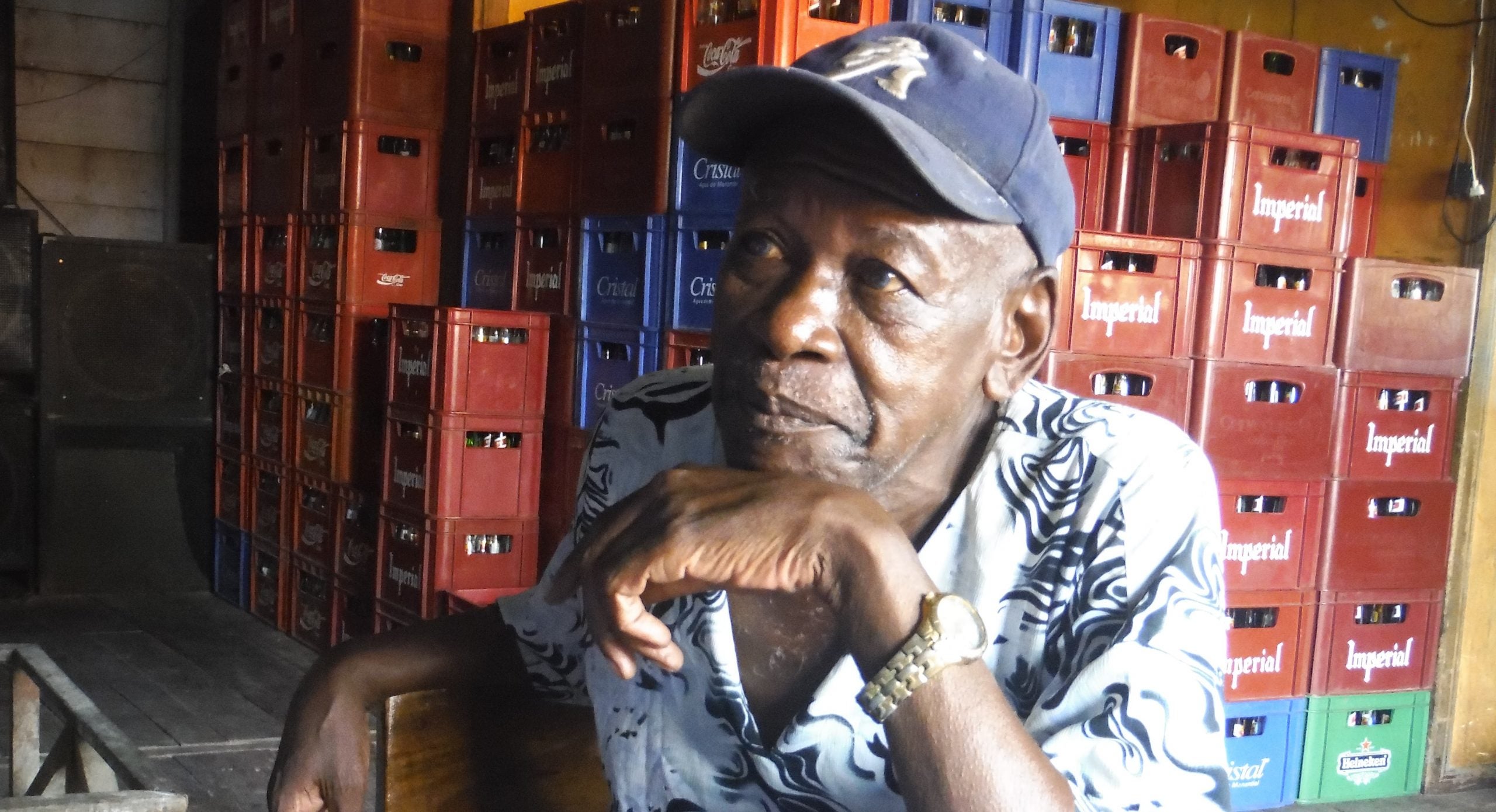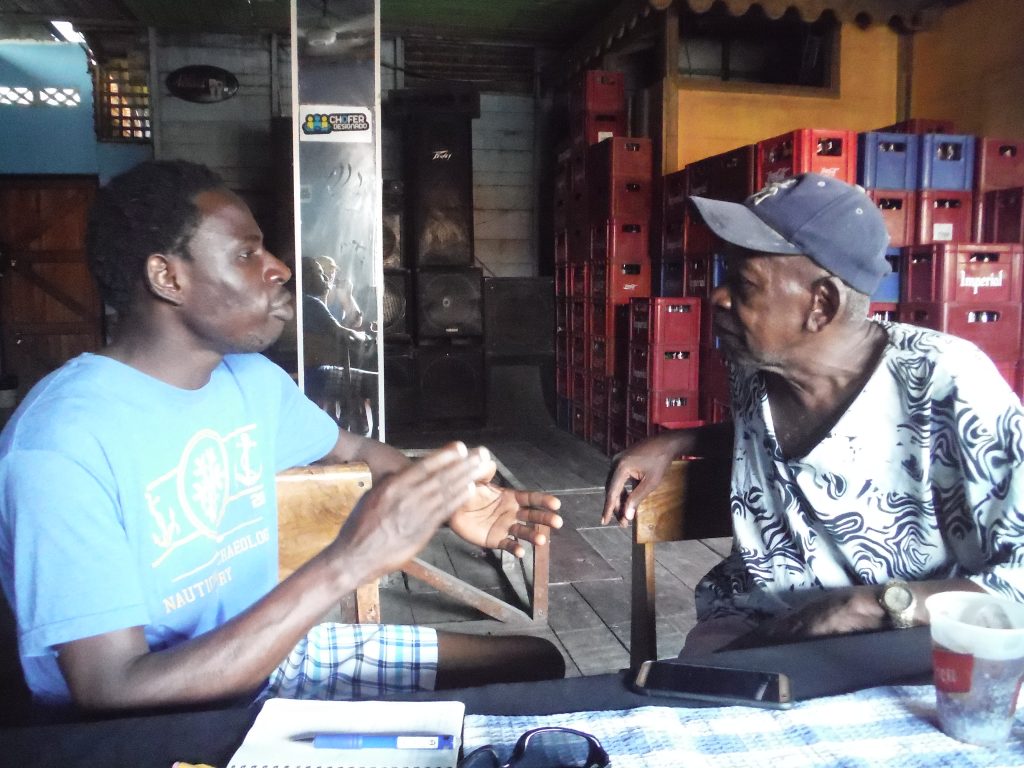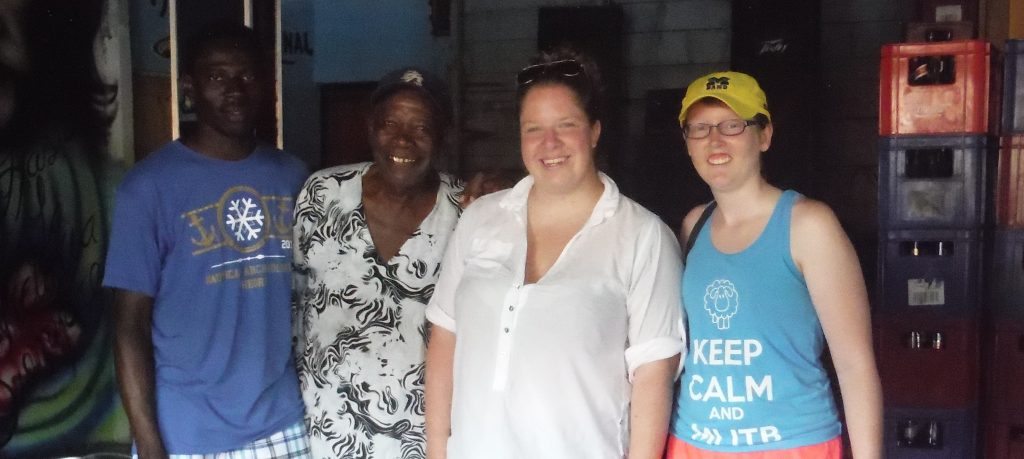Last night, after a very busy day at our sites, Jeremy and I decided to have some cold drinks at Coco’s bar, arguably the most popular in Cahuita. A band group called Kawa was playing and the atmosphere was nice. I noticed a man walk in and asked the bar man for some drinks. After a while, the lead vocalist for Kawa announced that Congo Man was “in the house” and that he should come up to the stage to sing. The atmosphere reached a frenzied pitch with the announcement of the name. I could see how excited everyone was and many flooded the dance area. His music was so good that even Jeremy had to hit the dance floor. Congo Man was only supposed to do one song, but ended up doing three because the crowd would not let him leave. At the end of each song, they would yell, “Mas! Mas!! Mas!!! …”, meaning “More! More!! More!!!” We approached him and asked if he would be willing to grant us an afternoon’s conversation. He was so friendly and we all agreed to meet by 2pm today, Sunday, at Coco’s bar.
By 1:50pm, Kelsey, Sydney and I left for Coco’s to meet Congo Man. We decided that we would wait for 45 minutes because of Costa Rican time and that we would leave by 2:45pm if we do not see him, but Congo Man was exactly on time.
“My secret is, I must tell you, I try to give a hundred percent of what I can give and whenever I hold that mic – believe you me when I hold that microphone – I try to give hundred percent of what I can so the younger generation like it, the older generation like it……it’s like the amount of love you put in it and the way you do it even the little children like it and I am happy when I see that.”
Robert Lauden Hibbert, aka Congo Man, is the toast of music lovers in Cahuita. Everyone in town – the young, middle aged, and even older folks – appreciate his music. Aged 77, and originally from Limon Central, he grew up in Panama where his music career kicked off. He started playing the guitar when he was eight and after a while, he began playing the trumpet, too. Today, he plays all kinds of music including American ballets, Latin ballets, Calypso (his favorite), Salsa, and Ranchera. He started composing his own music when he turned fifteen. His songs come with powerful messages and are mostly about his friends, past girlfriends, and life lessons. He got his first break when he performed on channel dos in Panama. Channel dos and channel cuatro were the only television stations in Panama at the time. There was fierce rivalry between the two and singers on their payroll were not allowed to sing or play for the other. He was playing for channel dos when the Director of channel cuatro, Clarence Martin asked him to play at their anniversary. He agreed risking the consequences that might come. He was, at that time, the only national artist that played six days every week. From there his music began to spread and he moved back to Costa Rica. His songs became so popular that, in 1977, he was chosen to represent Costa Rica at a music festival in Miami and he won the contest.
He came about the name Congo Man when Hyman Bar Bassack, an ardent fan of his songs who followed him wherever he performed, introduced him to at least ten friends as Congo Man. His reasoning was that the name was going to be lucky because Congo has the best musicians and dancers in Africa. Congo Man does not necessarily see any similarities between his songs and those from Congo, although he admitted that he thinks about Africa while composing his songs. He loves Africa so much and hopes to go there someday. The difference between his music and other’s is the passion he brings into it.
He had his first official band, Lasoprisa, in 1968 and has had between three and four different bands since, but cannot remember how long each lasted. His band is not active now, because they lack funds to buy new equipment. He plays with different groups currently and can perform with any band that wants him to join them. He does not see calypso music or any of his songs going extinct. Congo Man pointed out that the younger generation wants to learn and play his style of music, but they are not serious about it.
He is currently separated and has 22 children from 21 different women. They live in the United States, Costa Rica, and Panama. He has sold all his recordings at $10 each. This is how he makes money. He does painting and tailoring when not singing.


